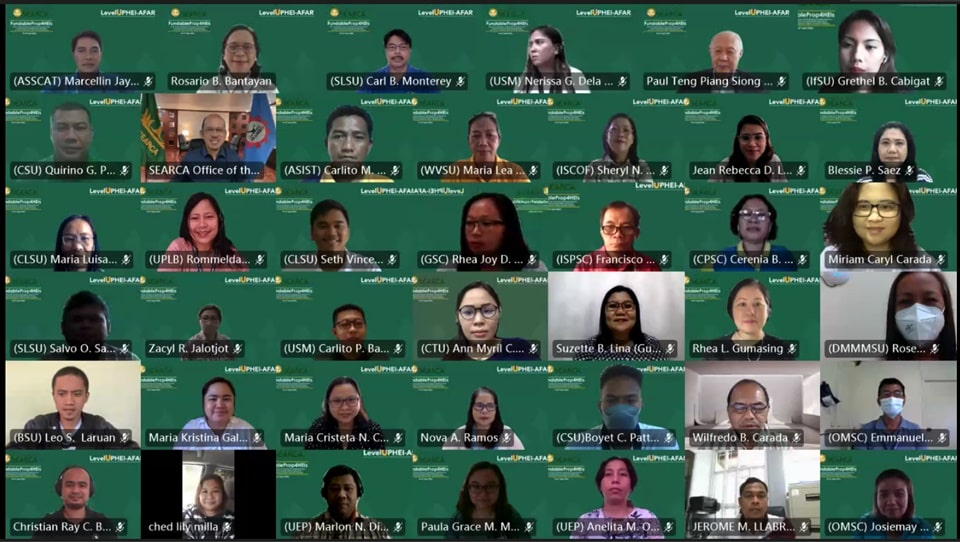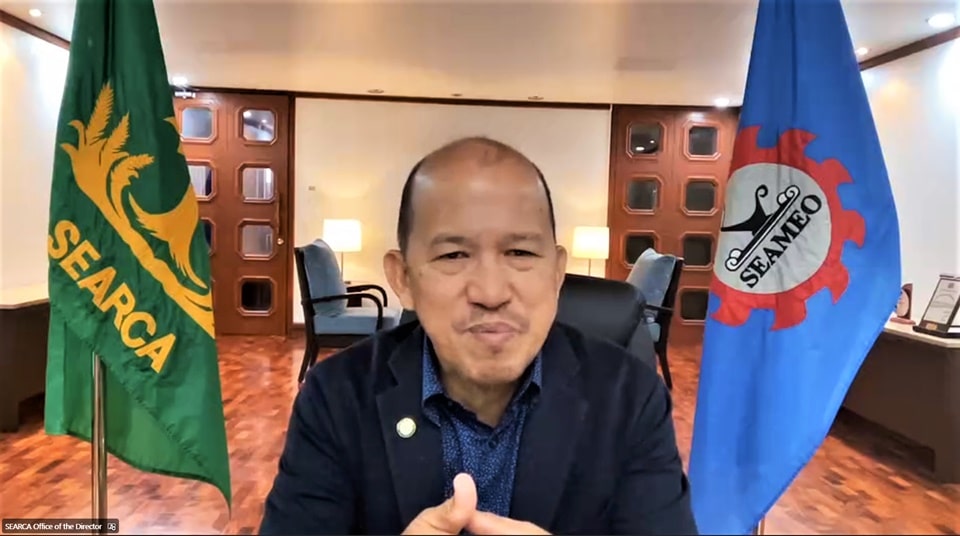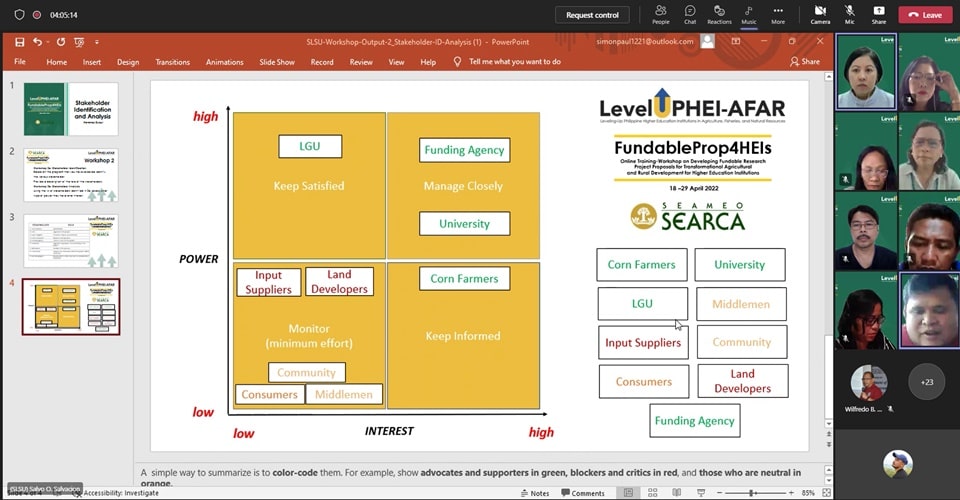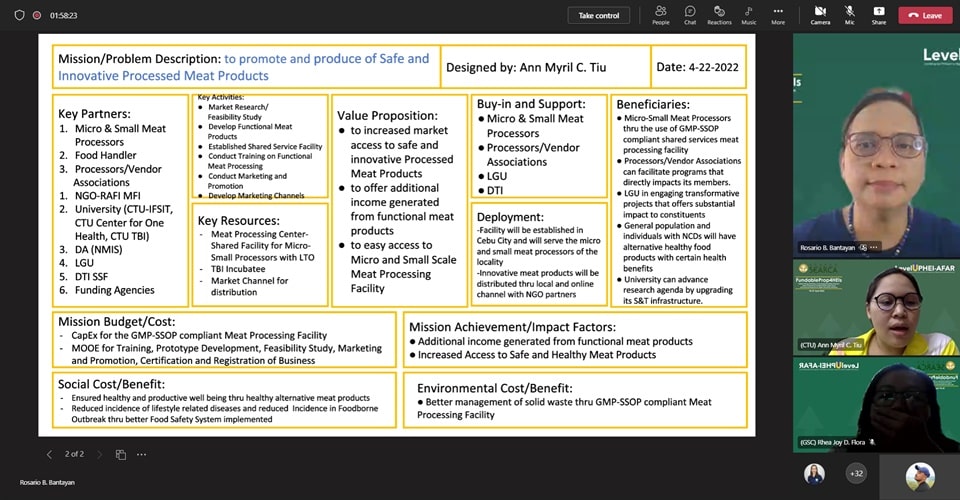In a world that is fast becoming more volatile, uncertain, complex, and ambiguous due to the disruptions caused by the pandemic, climate change, and other pressing realities, the need to reshape agricultural research and development in Philippine higher education institutions (HEIs) has only become increasingly urgent. HEIs, which play a major role in achieving national and global development targets, can address this need by becoming champions of transformational agriculture and rural development through research projects that promote food security and sustainable agriculture. But amid competing priorities and limited resources, how can HEIs make their research more appealing and thus, fundable?
The Southeast Asian Regional Center for Graduate Study and Research and Agriculture (SEARCA), with funding support from the Commission on Higher Education (CHED), responded to this need by organizing an online training-workshop that systematically details the process of developing and packaging research project proposals. Titled Online Training-Workshop on Developing Fundable Research Project Proposals for Transformational Agricultural and Rural Development for Higher Education Institutions (FundableProp4HEIs) the learning event gathered 35 participants from 24 HEIs for 10 half-day sessions on 18-29 April 2022 via SEARCA’s Online Learning and Virtual Engagements or SOLVE Platform.
 Participants, resource persons, and organizers of the FundableProp4HEIs flash their brightest smile for a group photo taken during the opening program of the training-workshop.
Participants, resource persons, and organizers of the FundableProp4HEIs flash their brightest smile for a group photo taken during the opening program of the training-workshop.
The FundableProp4HEIs, which is part of CHED’s Levelling-Up Philippine Higher Education Institutions in Agriculture, Fisheries, and Natural Resources (LevelUpHEI AFAR), introduced participants to the transformational perspective to the agricultural and rural development paradigm and developed their skills set in project ideas generation and prioritization, project design, and packaging proposals, as well as in serving as transformational managers in the research and development sector.
In her welcome message, Atty. Lily Freida M. Milla, Director IV of CHED’s International Affairs Staff, emphasized the need to beef up the capacity of HEIs in producing quality proposals for local and international funding. She also hoped that the training-workshop would prepare the participants for the challenges that they will face as leaders of their institutions and empower them in their role as contributors and experts in the field of agriculture.
Speaking on behalf of Dr. Edgardo E. Tulin, President of the State Universities and Colleges – Association of Colleges of Agriculture in the Philippines, Inc. (SUC-ACAP), Dr. Suzette B. Lina, SUC-ACAP Secretary, said that the training-workshop provides an opportunity for SUC-ACAP institutions to harness their skills in developing and packaging proposals and encouraged the participants to give their full cooperation and maximize the benefit of the online training.
 SEARCA Director Dr. Glenn B. Gregorio discusses the importance of developing 'winning' research project proposals in reshaping agricultural research and development in Philippine HEIs.
SEARCA Director Dr. Glenn B. Gregorio discusses the importance of developing 'winning' research project proposals in reshaping agricultural research and development in Philippine HEIs.
In his opening remarks, Dr. Glenn B. Gregorio, SEARCA Director, said that the country’s eventual return to normality amid the pandemic will offer many opportunities for research funding; thus, HEIs should be ready to have “winnable and meaningful” project proposals at hand. Dr. Gregorio also emphasized the roles of educators and researchers as frontliners for agriculture and education. A crucial part of this role involves bringing forth relevant and timely research outputs that respond to the needs of farmers and the society at large. Dr. Gregorio added that the promotion of the academe-industry-government connectivity is also integral to ensure that research produced are translated into useful outputs that stakeholders can benefit from.
 Mr. Salvo O. Salvacion of the Southern Luzon State University presents their school's output for the workshop on stakeholder identification and analysis.
Mr. Salvo O. Salvacion of the Southern Luzon State University presents their school's output for the workshop on stakeholder identification and analysis.
 Ms. Ann Myril C. Tiu of the Cebu Technological University-Main Campus receives feedback from the training-workshop facilitators on the mission model canvas she designed as part of the outputs of Module 4.
Ms. Ann Myril C. Tiu of the Cebu Technological University-Main Campus receives feedback from the training-workshop facilitators on the mission model canvas she designed as part of the outputs of Module 4.
Designed to walk the participants through the various stages of research project proposal development, the FundableProp4HEIs was structured into five modules that employ both lectures and workshops as main learning methodologies. Module 1 focuses on transformational agriculture and rural development and project cycle management, with emphasis on the drivers and strategies towards innovation and transformation in agricultural development, SEARCA’s Accelerating Transformation Through Agricultural Innovation or ATTAIN strategic framework, and the Project Life Cycle Approach. Module 2 delves into project ideas generation and prioritization, including key concepts and application of tools in situation analysis, generation, selection, and prioritization of project ideas. Module 3 on project design and business canvas formulation, meanwhile, discusses the tools in project design preparation. Module 4 tackles project proposal packaging, wherein the key elements and desired features of a winning proposal were discussed, as well as helpful tips in project proposal writing. Finally, Module 5 explores the role of project transformational managers in managing the project life cycle toward innovation leading to transformation.
Prof. Wilfredo B. Carada, Adjunct Professor at the College of Public Affairs and Development (CPAf), University of the Philippines Los Baños (UPLB), serves as the technical coordinator and lead faculty for the training-workshop. He is joined by other faculty members from UPLB CPAf, namely, Dr. Maria Kristina G. Alinsunurin, Dr. Miriam Caryl D. Carada, Dr. Rhea L. Gumasing, and Prof. Nelson Vincent B. Querijero, who serves as resource persons and workshop facilitators. Meanwhile, Dr. Paul Teng, SEARCA Senior Fellow and Managing Director and Dean of NIE International Pte Ltd, National Institute of Education, Singapore, discussed the drivers and strategies toward innovation and transformation in agriculture and rural development during the first session of the learning event on 18 April 2022.